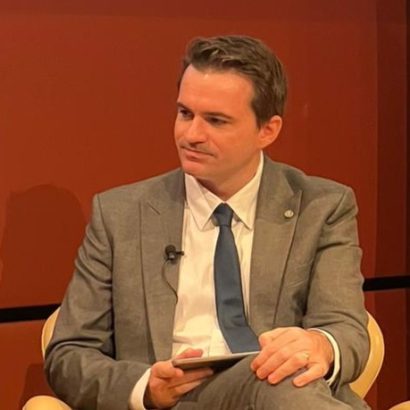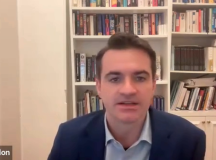John Lyndon is CEO of the Alliance for Middle East Peace (ALLMEP).
The news of a devastating IDF drone strike that killed seven humanitarian workers with World Central Kitchen (WCK) was a shocking development in a war that seems to plumb new depths each week. Others, such as Israeli journalist Barak Ravid have spoken expertly about the searching questions that this latest incident raises about the rules of engagement in Gaza, where the last six months—regardless of whose figures you choose to believe—have seen the largest number of civilian deaths in the history of the Israeli-Palestinian conflict.
It is already clear that the incident is spurring another question that is just as urgent, and ought to be spared the usual, increasingly tiresome, partisan politics of this war: who is going to feed the people of Gaza? Following the deaths of their employees, WCK suspended their activities in Gaza. Hours later, ANERA suspended theirs. Neither organisation felt that the safety of their staff could be assured. With the White House National Security Council spokesperson reporting that more than 200 aid workers have been killed in Gaza since 7 October, this is an understandable anxiety. Yet it means that over 600,000 daily meals that were being provided to Gaza on Monday, disappeared by Tuesday. A 240-tonne shipment of aid that was en route to Gaza has now turned back to Cyprus, and the United Arab Emirates, which was closely partnering with WCK, has paused its aid shipments pending an investigation and assurances from Israel that aid workers will be protected.
Only two weeks before this latest crisis, a report from the Integrated Food Security Phase Classification (IPC) initiative warned that famine is ‘imminent’ in northern Gaza. The report states that ‘over a million people are expected to face catastrophic hunger unless significantly more food is allowed to enter Gaza’. Before the recent months’ hostilities, 0.8 per cent of children under 5 years of age were acutely malnourished. The IPC report shows that as of February in the northern governorates, that figure is between 12.4 and 16.5 per cent. This reality should give pause and concern to all. With so many innocent lives already taken in both Gaza and Israel due to violence, we must do everything possible to ensure that hunger does not now claim many, many more.
As I told France 24 in an interview last week, ‘Famine is famine,’ and it ‘should go beyond politics, your position on a permanent ceasefire, or whether one is pro-Israeli or pro-Palestinian: we need to flood the Gaza Strip with food.’ Dr. Dahlia Scheindlin in an excellent piece two weeks ago in Ha’aretz, catalogued how many have denied the scale and severity of the humanitarian crisis in Gaza, lambasting those who ‘want you to just believe everyone else is wrong because they said so. They have their own facts.’ This of course mirrors the denialism we have seen among some advocates on the other ‘side’ of this increasingly dehumanising debate, who have called into question the events of 7 October. It is vital that those of us who see both Israelis and Palestinians as equals, and as human beings entitled to security, safety and basic necessities resist this toxic dynamic. But that alone is just a baseline, we also need action. And while the Israeli government, Hamas, and the international community each own varied shares of responsibility for the scandal of starving children, civil society – as so often during this war – is stepping in to try and do what it can to mitigate this crisis.
An estimated 2.23 million people are facing food insecurity, and this only accounts for Palestinians living in Gaza. Across the West Bank, East Jerusalem, and Bedouin communities in southern Israel, people are facing severe hardship. As are the tens of thousands of Israelis who remain evacuated from their homes in both the north and the south of the country.
ALLMEP is a network of over 160 civil society peacebuilding organisations, a coalition of hundreds of thousands of Palestinians and Israelis working to build an equal, just, and peaceful future for the region. Where government institutions are failing, many of these civil society actors are desperately trying to address hunger and provide basic necessities for these communities. While they cannot operate on anywhere near the same scale as important implementers like World Central Kitchen and others, they are nonetheless part of a civic response to this catastrophe—based on Israeli/Palestinian and Arab/Jewish partnership that is an important end in its own right— that deserves to be scaled
ALLMEP member, Rebuilding Alliance, has partnered with the World Food Program to serve more than 70,000 hot meals per day in Gaza at various locations. Rabbis for Human Rights, Parents Circle-Families Forum, Sulha Peace Project, Roots, and others are all delivering Ramadan food packages to families in need in the West Bank and East Jerusalem. These organisations’ collective efforts have reached over 1,000 families, delivering more than 6 tons of aid.
Other organisations in the ALLMEP network are working directly with Bedouin communities in southern Israel. AJEEC-NISPED, for example, provides emergency medical services to about 40,000 residents of the Bedouin localities in the Negev, particularly to the unrecognised villages which are spread over an area of about 400 square kilometres. Ambulances make rounds between the villages, ready for any call, and provide first response medical treatment in the field as well as a quick evacuation to local hospitals and clinics.
Similarly, Tzedek Centers part of its mission around supporting impacted families in the South of Israel, providing educational support, activities and emergency respite for families evacuated from the South.
At the same time, 1,000 Jewish and Palestinian citizens of Israel assisted ALLMEP member Standing Together in preparing and driving more than 40 caravans of humanitarian aid to the Gaza border. Though they were turned away, the initiative sheds light within Israel on the dire humanitarian situation, and on the power of Arab-Jewish partnership. Rabbis for Human Rights has joined demonstrations at Ashdod Port to demand more humanitarian aid enter Gaza to handle the catastrophic starvation, for an end to the bloodshed, and for the release of the remaining hostages.
Similarly, Standing Together, has been trying to escort convoys of food and emergency aid to the Gaza border. These convoys were twice stopped by police and military forces last week. Standing Together wrote, ‘We demand that our government does everything in its power to increase the supply of aid to the Gaza Strip, and reach a ceasefire and hostage release deal to save the lives of innocent people in Gaza and to bring the hostages back.’
Civil society has been shown throughout this war to be one of the greatest sources of resilience and strength within and between both Israeli and Palestinian society. As well as the one precious place where Arab-Jewish and Israeli-Palestinian cooperation and solidarity are being sustained. These organisations – their core values, as well as their vital, irreplaceable work – are doing extraordinary things during this horrendous war. Yet their role in its aftermath, and the much debated ‘day after’ could be even more pivotal. As former British MP and Minister of State for the Middle East Alistair Burt wrote in a recent piece in Arab News, urging civil society to be at the core of any diplomatic process that follows this war ‘With the limitations of the existing political leaderships so apparent, it is not unreasonable to demand that civil society efforts be fed into the horizon of a revived peace process. Amid failure, their efforts have been a success.’




































